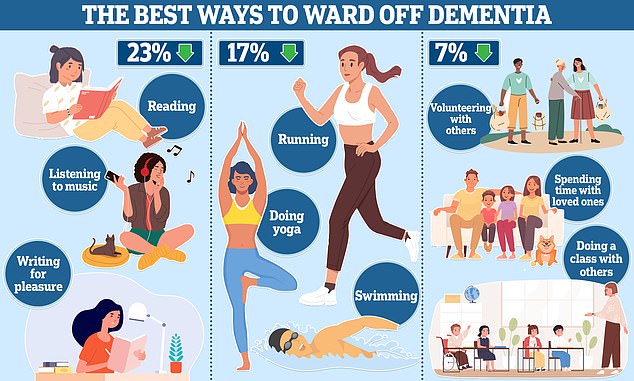It’s well known that spending too much time sitting on your stomach can increase your risk of a multitude of diseases, from diabetes to dementia.
But scientists have discovered that when it comes to protecting the brain from age-related decline, there are some sedentary activities that may be beneficial.
Researchers at the University of South Australia have developed a “hierarchy” of hobbies done while sitting, and say some have more positive than negative brain effects.
At the top of the “beneficial list” are activities that are said to be mentally or socially stimulating, such as reading, listening to music, praying, doing crafts, playing a musical instrument, or chatting with other people.
The scientists said these behaviors improved memory and thinking abilities, which helps protect against dementia in old age.
But the worst thing for the brain is watching television and playing video games.
A large body of research has suggested that prolonged television viewing is linked to a reduction in gray matter in the brain, crucial for thinking, reasoning, decision-making and a host of other important cognitive functions.
Imaging studies show that the less gray matter there is in a person’s brain, the worse their cognitive abilities.
Previous studies have found that frequently watching television for more than three hours can affect learning and memory skills.
Experts believe this may be due to a lack of stimulation causing connections between brain cells to disappear.
For the new study, researchers evaluated the 24-hour activity patterns of 397 people over the age of 60.
They then assessed the participants’ cognitive abilities using two written tests used by experts to detect signs of dementia or deteriorating brain health.
In an article in the medical journal The Journals of Gerontology Series A, scientists reported that those who spent more time doing “mentally stimulating” sedentary activities performed better on cognitive tests.
“We already know that physical activity is a strong protector against dementia risk,” said co-author Dr. Maddison Mellow.
“This should certainly be a priority if you are trying to improve brain health.
“But until now we hadn’t directly explored whether we can benefit our brain health by swapping one sedentary behavior for another.
“We found that sedentary behaviors that promote mental stimulation or social participation, such as reading or talking with friends, are beneficial for cognitive function, while others, such as watching television or playing games, have a negative effect.

People who regularly read books, play musical instruments or keep a personal journal have a 23 percent lower risk of developing this disease.
‘Therefore, the type of activity is important.
“While the message of ‘move more, sit less’ certainly holds true for cardiometabolic and brain health, our research shows that a more nuanced approach is needed when it comes to cognitive function.”
Dr. Mellow advised older adults to intersperse more passive activities with engaging activities, even if only for five minutes at a time.
“Small time swaps of five minutes can have benefits,” he said. “So if you’re set on watching a movie marathon, try breaking up that time with some physical activity or a more cognitively active sitting activity, like reading, at some point.”
“This way, little by little you will be able to acquire healthier habits.”
Surveys have found that around half of Britons say they are happy to watch consecutive episodes of TV shows for up to four hours.
The new study echoes previous findings about the risks of Netflix binge-watching for brain health.
In 2019, British researchers published research that revealed television viewing for more than three and a half hours a day is related to a decrease in performance on word learning and retrieval tasks.
The researchers first measured how much television 3,590 people over 50 watched on average each day.
They then classified the study participants into five categories, based on the amount of television they watched.
The researchers also used tests to measure verbal memory and thinking twice, six years apart.
They found that watching television for more than three and a half hours a day is associated with worse verbal memory.
Around 944,000 people in the UK have dementia, with Alzheimer’s disease being the most common type.
Dementia was the leading cause of death in the UK in 2023: 75,393 people died last year, compared to 74,261 in 2022 and 69,178 in 2021, according to Alzheimer’s Research UK.
Research indicates that around half of all cases are due to lifestyle factors such as smoking, poor diet, obesity, lack of exercise and infrequent mental stimulation.


